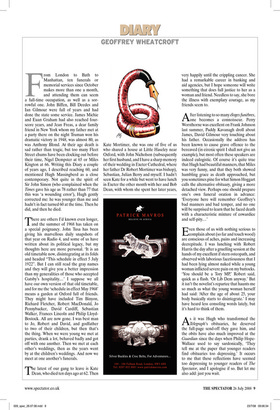F rom London to Bath to Manhattan, ten funerals or memorial
services since October makes more than one a month, and attending them can seem a full-time occupation, as well as a sorrowful one. John Biffen, Bill Deedes and Ian Gilmour were full of years and had done the state some service. James Michie and Euan Graham had also reached fourscore years, and Jean Freas, a dear family friend in New York whom my father met at a party there on the night Truman won his dramatic victory in 1948, was almost 80, as was Anthony Blond. At their age death is sad rather than tragic, but too many Fleet Street chums have been clocking out before their time, Nigel Dempster at 65 or Miles Kington at 66. Writing this Diary a couple of years ago, I described reaching 60, and mentioned Hugh Massingberd as a close contemporary. Not quite in the spirit of Sir John Simon (who complained when the Times gave his age as 78 rather than 77 that this was ‘a wounding error’), Hugh gently corrected me: he was younger than me and hadn’t in fact turned 60 at the time. Then he did, and then he died.
There are others I’d known even longer, and the summer of 1968 has taken on a special poignancy. John Tusa has been giving his marvellous daily snapshots of that year on Radio 4, and some of us have written about its political legacy, but my thoughts here are more personal. ‘It is an old timetable now, disintegrating at its folds and headed “This schedule in effect 5 July 1922”. But I can still read the gray names and they will give you a better impression than my generalities of those who accepted Gatsby’s hospitality...’ I suppose we all have our own version of that old timetable, and for me the ‘schedule in effect May 1968’ means a garden at Oxford full of friends. They might have included Tim Binyon, Richard Fletcher, Robert MacDonald, Jo Pennybacker, David Cardiff, Sebastian Walker, Frances Lincoln and Philip LloydBostock. All are now gone. I was best man to Jo, Robert and David, and godfather to two of their children, but then that’s the thing. When we were young we met at parties, drank a lot, behaved badly and got off with one another. Then we met at each other’s weddings, then as the years went by at the children’s weddings. And now we meet at one another’s funerals.
The latest of our gang to leave is Kate Dean, who died ten days ago at 62. Then Kate Mortimer, she was one of five of us who shared a house at Little Haseley near Oxford, with John Nicholson (subsequently her first husband, and I have a sharp memory of their wedding in Exeter Cathedral, where her father Dr Robert Mortimer was bishop), Sebastian, Julian Berry and myself. I hadn’t seen Kate for a while but went to have lunch in Exeter the other month with her and Bob Dean, with whom she spent her later years, very happily until the crippling cancer. She had a remarkable career in banking and aid agencies, but I hope someone will write something that does full justice to her as a woman and friend. Needless to say, she bore the illness with exemplary courage, as my friends seem to.
After listening to so many éloges funèbres, one becomes a connoisseur. Perry Worsthorne was excellent on Frank Johnson last summer, Paddy Kavanagh droll about James, David Gilmour very touching about his father. Occasionally the address has been known to cause grave offence to the bereaved (in eirenic spirit I shall not give an example), but most often these speakers are indeed eulogistic. Of course it’s quite true that Hugh had beautiful manners, that Miles was very funny, and that they both showed humbling grace as death approached, but you sometimes pine for what Simon Hoggart calls the alternative obituary, giving a more detached view. Perhaps one should prepare one’s own funeral oration in advance: ‘Everyone here will remember Geoffrey’s bad manners and bad temper, and no one will be surprised to learn that he faced death with a characteristic mixture of cowardice and self-pity...’ Even those of us with nothing serious to complain about (so far and touch wood) are conscious of aches, pains and increasing decrepitude. I was lunching with Robert Harris the day after a gruelling session at the hands of my excellent if stern osteopath, and observed with laborious facetiousness that I had been lying almost naked while a young woman inflicted severe pain on my buttocks. ‘You should be a Tory MP,’ Robert said, quick as a flash. ‘Or Lib Dem anyway.’ But it isn’t the novelist’s repartee that haunts me so much as what the young woman herself had said: ‘After the age of about 25, your body basically starts to disintegrate.’ I may have heard less consoling words lately, but it’s hard to think of them.
As it was Hugh who transformed the Telegraph’s obituaries, he deserved the full-page send-off they gave him, and the obits have also much improved at the Guardian since the days when Philip HopeWallace used to say sardonically, ‘They tell me at the paper that younger readers find obituaries too depressing.’ It occurs to me that these reflections have seemed too depressing to younger readers of The Spectator, and I apologise if so. But let me also add: just you wait.


























































 Previous page
Previous page